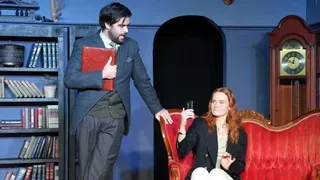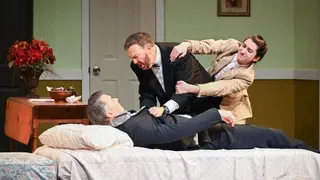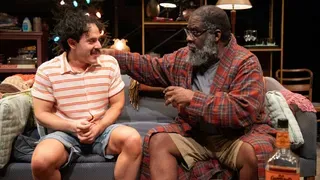
November 1, 2023
Review: 'Nuovo Olimpio' a Cinema Paradiso of Timeless Passion
Kilian Melloy READ TIME: 5 MIN.
Love, time, nostalgia, and movies form a potent mixture in Ferzan Özpetek's newest feature, a decades-spanning romance that dips into emotionally textured drama worthy of Pedro Almodóvar.
Ozpetek's 14th feature, "Nuovo Olimpio" is more than a sexy melodrama wearing its throbbing heart on its brightly colored sleeve; it's also a winking dance around the notion of metafiction, teasing its audience with the sorts of questions the film cheekily asks in the course of its hour-and-50-minute running time. The film tells us from the start that it's based on a true story; whose? And how much? There's fun to be had in thinking that over.
Beginning with an attention-grabbing scene of dread and violence that turns out to be a scene in a movie, the film introduces its two male leads on Nov. 1, 1978 - a date when Enea (Damiano Gavino), a film student, is working as a production assistant on a night shoot in Rome. His eye catches that of a rubbernecker - Pietro (Andrea Di Luigi), a medical student - for a brief moment.

When the two spot each other once again at a repertory theater called Nuovo Olimpio, they make their way to the men's room – a well-known cruising ground – but Pietro, who's new to the gay scene, doesn't want to have quick sex; he wants to get to know Enea. Intrigued, Enea agrees to meet the next day, but then meets up with with Alice (Aurora Giovinazzo) to work off his horny energy.
That's a lot of setup, but the movie makes it feel easy and fun, leading from there into a sexy assignation at a borrowed apartment overlooking the most historically scenic part of Rome. A full-fledged romance blossoms, complete with hot, artful sex scenes that bring together male full-frontal nudity (of a comfortably naturalistic sort that makes the way other films disguise or block out actors' privates seem coy, if not disingenuous) with intimate dancing and eating marmalade off each others' fingers. Ozpetek isn't slowing down his momentum for anything; it's full-tilt passion, with the lovers taking rides around the city on a scooter (what could be more Italian?) and making the theater into a frequent meeting spot.
But the political situation in Italy is fraught, and violent protests break out. It's as a result of one such contretemps that Pietro and Enea lose touch, with Pietro being injured in an accident. The closest thing either of them has to the other's contact information is a city map scrawled with the invitation, "Follow the map so time and space won't get in the way" – a swell narrative touch (as is the knowing inclusion of the line "Do you come here often?" early in the men's courtship), but not helpful when it comes to tracking down your new lover at a time when the streets are mobbed with cops in riot gear and tear gas.

November 1, 1988: It's 10 years later, and Enea, now a director, is filming a movie that draws directly (and in painstaking re-enactment) from the torrid romance he enjoyed 10 years earlier. He and Alice are still occasional bedmates, but he's searching for the sort of connection he knew with Pietro all those years ago; his drive and passion mark the movie, making it controversial and drawing the wrath of the country's censors, who accuse Enea of "obscenity." Audiences are enraptured, though – and Pietro, now a doctor and married to Giulia (Greta Scarano), is struck to the heart when he sees the film.
More November 1sts pass as the film progresses through time – 1993; 2015 – and both Pietro and Enea build lives and careers, with Enea becoming involved with an athletic guy named Antonio (Alvise Rigo, who seems destined to become a breakout hunk) and Pietro thriving more as a doctor than as a husband. Poor Giulia yearns to be loved in a way he's just not capable of.
Ozpetek has made a number of films centering around gay characters; you can almost hear him quoting himself when Enea is asked, at a panel discussion, why his films talk about gay themes so frequently. ("I don't address it often," Enea answers; "Everyone else just never does.") A master of mood and atmosphere, the director's work in films like 1997's "Steam: the Turkish Bath" and 2007's "Saturn in Opposition" ground similarly colorful casts and emotionally rich material in a sense of the world as it is. Here, that's replaced by a sense of the world as a stage where memory and complexities of the imagination have space to play out in ways that may not be entirely realistic. A crucial turning point for Enea arrives as he commences his 14th feature – another wink from a director who knows he's got us hooked?
"Nuovo Olimpio" is unabashed in its sentiment, but rigorous in its narrative discipline. How, and if, circumstances will bring the two lovers back together – and how they can possibly find a satisfactory resolution to the youthful romance that was interrupted so long ago – is the juicy problem at the heart of this sudsy, yet earnest, melodrama. Suffice it to say, Ozpetek sticks the landing, finding a sweet, satisfying answer – maybe the only possible one.
Which brings us to the most urgent November 1 of them all: Nov. 1, 2023, the day "Nuovo Olimpio" premieres on Netflix. Stream, surrender, and enjoy!
"Nuovo Olimpio" streams on Netflix starting Nov. 1.
Kilian Melloy serves as EDGE Media Network's Associate Arts Editor and Staff Contributor. His professional memberships include the National Lesbian & Gay Journalists Association, the Boston Online Film Critics Association, The Gay and Lesbian Entertainment Critics Association, and the Boston Theater Critics Association's Elliot Norton Awards Committee.







